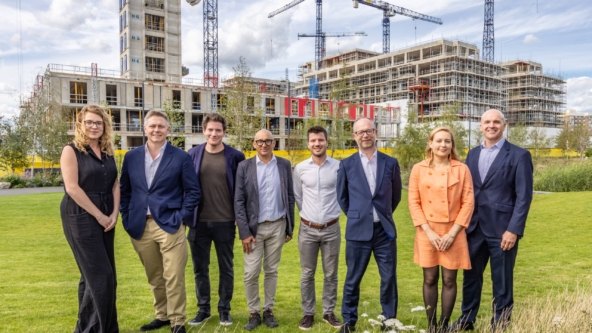“The drive for sustainable real estate debt financing has only just begun and it has limitless opportunities.”
Benjamin Davis, CEO of Octopus Real Estate
Benjamin Davis, CEO of Octopus Real Estate shares his thoughts on sustainable real estate debt financing.
What do you see as being the current major trends and issues in green/sustainable real estate debt financing? Why do you say that?
One of the big issues, which the sector has been slow to acknowledge and address, is how we are going to fund all the retrofitting that will be needed to bring buildings up to the required energy efficiency standards. There’s a concept called embodied carbon, where you measure the carbon that’s embodied in a building – what’s required to build it, to run it and then potentially dispose of it at the end of its life. Many people are focused on developing new buildings, which have the right energy ratings and meet efficiency standards. Building those on a greenfield site would be fine but if you’re knocking down a 30-year-old building, there’s a carbon cost in doing that. This raises clear questions on how we encourage and combine institutional funding, government incentives and industry action to help retrofit and future proof existing buildings, rather than simply replacing them. We’re witnessing this dynamic in the residential sector, as the government has announced grant funding for air source heat pumps. This is a multi-billion-pound investment opportunity across residential and commercial property.
How wary should we be of greenwashing?
Greenwashing is incredibly debilitating, particularly for a fledging industry, such as green real estate debt. It detracts from the positive progress that is being made and discourages everyone in the ecosystem from putting their full weight behind the sector, which is what is sorely needed if we are to help solve the world’s greatest problems, like climate change. Ultimately, I believe it will increasingly fade from consciousness as people gain confidence through seeing a greater number of initiatives come to fruition, successful results, increased regulation and clearer, fuller reporting. Most people want to do the right thing and that will count for a lot. For the sceptics, a key source of comfort could come from working with fund managers or companies who are certified B Corporations: profit-making companies independently certified to meet very high standards of social and environmental performance, accountability, and transparency. Octopus secured B Corp status in 2021 and we’re already seeing the hard work we put in paying off. I would encourage more companies to start their B Corp journey too. As a concept linked to greenwashing, but slightly different and one that we may come to hear more about, I expect demonstration capital could be an increasing concern. Demonstration capital is capital that is invested in an asset because the investor prioritises social obligations and views rather than the underlying companies’ true value, which may put the investor in a position where their capital is misallocated. This could be equally as dangerous to the growth of the sector as greenwashing. It will be up to fund managers to ensure they are presenting opportunities to investors that don’t sacrifice financial returns for ESG benefits but provide both. This is something we’re laser focused on at Octopus.
Are some managers/investors more active in the field than others?
As with any new market or asset class, you will always find the innovators and early adopters who are pushing the industry forward, and sustainable real estate debt is no different. Likewise, to paraphrase the famous saying: to the early victor go the spoils. We saw it happen with the solar power industry: those managers, of which Octopus was fortuitously one, and investors who got on board early when the asset class was nascent but growing, reaped the greatest rewards. Those who waited for further price reductions or greater government subsidies didn’t benefit as strongly. So far, the industry has largely been driven by managers, but that dynamic is shifting, and I believe investors will increasingly take the lead. The investors we speak to are more concerned than ever about the impact of their capital or the ‘so what’ factor beyond a target return. They are looking to deploy capital that will achieve both a financial gain and a genuine impact, whether that is linked to climate change or for a social benefit.
Is it just another fad or are we living through a genuine sea change? Again, why do you say that?
The drive for sustainable real estate debt financing has only just begun and it has limitless opportunities. The analogy I keep coming back to is free-range eggs. Twenty years ago, not many people cared where their eggs came from, but now, over 70% of shop-bought eggs are free range. Sustainable real estate will go through that same evolution, even if it’s a slightly slower journey. With the current news surrounding rising energy prices and people being more aware than ever of their own impact on the environment, a larger amount of energy efficient real estate is essential. And you cannot have the assets if you don’t have the debt to finance new construction or retrofit existing properties. In addition to consumer demand, regulation will provide another fillip: under the new government MEES regulations set to be introduced in 2023, buildings in England and Wales with an energy efficiency rating lower than ‘E’ will not be permitted to be let out. As a result, it’s likely that many investors, landlords and building owners are going to need to invest heavily to get their properties up to scratch, and debt financing will have a strong role to play. The knock-on impact is that demand for energy efficient buildings will rise, followed by growth in their value and increased appetite from investors. It will be a self-fulfilling cycle.
Can you point to cases studies to illustrate your thinking on the subject?
In November 2021, Octopus Real Estate announced a partnership with Homes England, the government’s housing delivery agency, to provide £175 million in funding and expert support to SME housebuilders, enabling them to build more high-quality, energy efficient homes. The homes funded must achieve a minimum Energy Performance Certificate (EPC) rating of B and the housebuilders will benefit from increasing interest rate margin discounts as the energy efficiency of the homes increases above this – for example, homes achieving an EPC rating of A will benefit from interest rate margin discounts of 2%. Taking a 7% interest rate down to 5% is material. But it’s about more than just providing a financial incentive. We’re also working with our sister company, Octopus Energy, and McBains, which has an environmental sustainability practice, to provide education to housebuilders. While many of them have the appetite, they currently lack the in-depth know how to deliver environmentally friendly homes. By starting at the grassroots with the small housebuilders, we hope this will become part of the natural development process across the industry. Since we announced the joint venture, we have had significant interest from investors who are keen to get involved in similar initiatives, and to me, that shows this is more than just a temporary trend.
Useful insights
Real Estate Commercial Debt Capability
We are an award-winning provider of non-bank, short-term lending to commercial properties in the UK.
Octopus Real Estate and Homes England launch £175m Greener Homes Alliance
We are providing discounted development finance to support housebuilders in the UK to build high quality energy efficient homes.
Octopus Vision
Find out what Octopus are doing to have a positive impact on our planet and its people.

Octopus Launches Private Debt Offering & Appoints New Team

Investing with care: The key to resilient returns in the UK care sector


